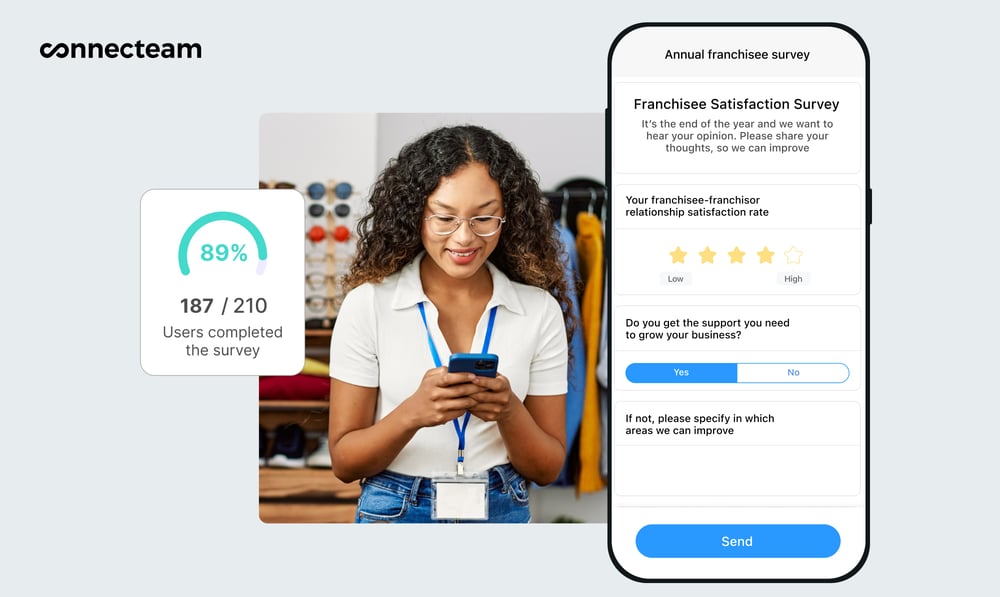This article will delve into the advantages and disadvantages of franchising, so you can make an informed purchasing decision that’s best for you and your business.
Opening a franchise can be highly tempting to those interested in starting a business or growing their existing one. With an established brand and proven track record, a franchise can seem like a sure thing with little chance of failure.
Before jumping in, however, ensure you understand the advantages and disadvantages of franchising. As with any business model, franchising comes with its unique set of challenges not everyone will be ready to take on.
This guide will cover franchise advantages and disadvantages, so you can decide whether this business model is for you.
Advantages of Franchising
If you’ve ever traveled to a new city and been surprised to see many of the same stores and restaurants you frequent at home, you’ve seen the power of franchises.
When you purchase a franchise, you buy the brand rights from a franchise owner or franchisor and become a franchisee.
The details of each franchise agreement will vary, but generally, you’ll pay an upfront franchise fee and royalties on your profits.
Although this investment can be significant, there are many benefits to this type of business model for both the franchisee and the franchisor.
For the Franchisee
1. Established Brand Recognition
Brand recognition fosters trust among customers. When consumers are familiar with a brand and its products or services, they develop confidence in its quality and consistency. You can tap into this trust that drives customer loyalty when you buy a franchise, leading to repeat business and positive word-of-mouth promotion.
This established recognition allows franchisees to capture a larger share of the market and build an immediate customer base. You won’t have to spend years establishing yourself and growing your business from scratch.
Brand recognition can also influence customers’ perception of value. When a brand is well-established and known for its high-quality offerings, customers are often willing to pay a premium for its products or services, which translates into higher profit margins.
2. Proven Business Model
Franchises offer a blueprint for business success. When a franchise has a well-established, tried-and-tested operational model, that means it’s already fine-tuned the operations, strategies, and systems that work best for its concept. This model minimizes — but doesn’t eliminate — your risk of failure.
You can rely on the franchisor’s experience and knowledge to navigate the intricacies of the market. By following the established guidelines, you can avoid common pitfalls and increase your chances of success. It’s the difference between following a recipe and making it up as you go along.
When you follow an established model, you can accelerate the startup phase. Considering a particular model has been effective already, you can launch your operations and start generating revenue faster.
Following a guide can also simplify the decision-making process. Since the franchisor has identified the best practices, you can confidently make decisions backed up by the brand’s collective experience and data-driven insights.
💡 Pro Tip:
Modern business management tools like Connecteam can help you implement a franchisor’s business plan effortlessly. Manage your franchise’s daily operations effortlessly with Connecteam’s intuitive platform, enabling seamless communication, streamlined task delegation and tracking, efficient shift scheduling, and centralized sharing of updates and documents.
3. Support and Training
Franchisors typically provide in-depth training programs to help you understand the business operations, processes, and systems. These programs cover various aspects, including product knowledge, customer service, marketing, sales techniques, and inventory management. This thorough training provides the skills and knowledge necessary to manage your businesses effectively.
Additionally, many franchisors offer continuous support to ensure you have access to the resources and guidance needed to succeed. You might receive regular consultations, performance evaluations, and assistance in addressing any challenges that may arise. Ongoing support can help you adapt to changing market conditions and sustain your businesses over time.
🧠 Did You Know:
Connecteam’s advanced employee training capabilities let you take all this valuable training to your team in minutes. You can create customized courses send training materials directly to your employees’ devices. Easily track their progress, quiz their knowledge, and provide additional training where needed.

Franchisors invest in the research and development of new products, services, and technologies to maintain their competitive edge. As a franchisee, you can access this research and the latest tools, software, and systems to streamline operations and enhance the customer experience.
Finally, many franchisors offer guidance in selecting the ideal location for your business and may even assist in negotiating leases and developing the site. This support ensures that your franchise is situated in a strategic location, maximizing its potential for success.
4. Economies of Scale
There’s a lot of power in being part of a large organization. The collective bargaining power of a franchise can help you run your business more efficiently in the ways discussed below.
- Bulk purchasing discounts: Franchisors often negotiate favorable pricing and terms with suppliers on behalf of their franchisees. By aggregating the purchasing power of the entire franchise network, franchisors can secure lower prices for products, equipment, and services.
- Shared marketing and advertising costs: Franchisors often manage national or regional marketing campaigns for the entire brand, distributing the costs across the franchise network.
- Research and development: Franchisors invest in R&D to maintain their competitive edge and stay ahead of industry trends.
For the Franchisor
1. Rapid Expansion
When you allow franchisees to open their own branches, you can grow faster than if you were taking on all of the risks. Some benefits of rapid expansion include:
- Wider market penetration: Rapid expansion allows a franchisor to establish a presence in numerous markets, both domestically and internationally.
- Brand recognition: As the number of franchise outlets grows, the brand becomes more recognizable and familiar to consumers, leading to more revenue streams.
- Competitive advantage: Expanding rapidly can give a business a competitive edge by allowing it to secure prime locations, develop a strong brand presence, and establish a reputation before its competitors have the opportunity to do so.
- Operational efficiency: A larger network of franchisees can lead to more streamlined operations, as best practices and successful strategies can be shared across the entire system.
2. Lower Capital Expenditure
Licensing franchisees allows you to expand with significantly less financial investment. Franchisees are responsible for financing their individual locations, providing you with several benefits:
- Financial efficiency: You can allocate resources more efficiently, focusing on high-impact areas such as brand development, marketing, product innovation, and system-wide improvements.
- Reduced financial risk: By relying on franchisees to finance new outlets, you reduce your exposure to the financial risks associated with expansion.
- Better cash flow: With reduced capital expenditures, you’ll have improved cash flow since you don’t have to allocate significant resources to opening new locations.
3. Royalty Income
Royalty income is an ongoing stream of revenue generated by your franchisees. It’s typically calculated as a percentage of each franchisee’s gross sales or revenue. Royalty income compensates you for letting franchisees use your brand.
Benefits of royalty income include:
- Steady revenue stream: Royalty income provides a stable and consistent source of revenue, which can be used to support your business’s operations, growth, and development.
- Alignment of interests: Since royalty income is tied to the performance of franchisees, they’re just as invested in the success of your brand as you are.
- Low overhead costs: Royalty income is generally a passive source of revenue with minimal overhead costs for you.
- Financial stability: A diverse network of franchisees contributing regular royalty payments can provide financial stability, helping to mitigate the risks associated with economic downturns, market fluctuations, or other challenges.
Disadvantages of Franchising
Franchise advantages and disadvantages go hand in hand. Although there are significant benefits of franchising, there are also some drawbacks you should consider before you make a decision — whether you’re considering buying or offering franchising rights.
For the Franchisee
1. High Start-up and Ongoing Costs
Franchisees must pay various fees and expenses to join a franchise system, which can significantly impact initial investments.
Some of the initial costs associated with franchising include:
- Franchise fees: You’ll typically have to pay an upfront franchise fee. This fee grants you the right to use the franchisor’s brand, business model, and support systems. These fees vary widely depending on the franchise, but they can be substantial, particularly for well-established and popular brands.
- Build-out and equipment costs: You might need to invest in buildings, equipment, and fixtures that meet the franchisor’s specifications. These requirements can be more stringent and costly compared to what you might choose as an independent business owner.
- Initial inventory and supplies: You’re usually required to purchase initial inventory and supplies from approved vendors.
- Training expenses: Although franchisors provide training and support, you may need to cover the costs of attending training sessions, such as travel, accommodation, and lost revenue during the training period.
2. Limited Freedom
Using a prescribed method for running a franchise can make running your franchise business simpler, but it also limits your freedom in the following ways:
- Adherence to systems and processes: As a franchisee, you must follow the franchisor’s prescribed business model, operations, and procedures, including specific methods for delivering products or services, inventory management, customer service, and marketing strategies. While these systems will maximize efficiency and success, they may limit your ability to make independent decisions or implement your ideas.
- Restricted product or service offerings: You’ll only be able to offer the products or services approved by the franchisor, limiting your ability to adapt to local market demands or capitalize on new opportunities.
- Limited control over suppliers: You may be required to purchase inventory, equipment, and supplies from franchisor-approved vendors, which can constrain your ability to negotiate better pricing and terms or source alternative products.
📚 This Might Interest You:
Read our in-depth guide on the considerations of buying a franchise vs. starting your own business and the collection of the best franchise scheduling tools as well as the best franchise management software.
3. Royalty Payments
Royalty payments make a common ongoing expense when a business owner buys into a franchise. They can be a significant disadvantage of franchising, as they may reduce your profitability and cash flow over time.
Franchisees make these payments to the franchisor as compensation for ongoing support, access to the brand, and use of the franchise system’s resources.
Here are some key reasons why royalty payments make a disadvantage in franchising:
- Impact on profitability: Royalty payments typically make a percentage of your gross sales, which can reduce the overall profits.
- Fixed expenses regardless of performance: Royalty payments are usually required regardless of your financial performance. Even during periods of low sales or economic downturns, you must continue making these payments, which can place additional strain on your cash flow and financial stability.
- Potential for a perceived imbalance of value: You may feel that the value you receive from the franchisor in terms of support, resources, and brand recognition does not justify the ongoing royalty payments.
- Inflexibility in negotiation: The franchisor usually predetermines royalty fees and terms, which means they may not be open to negotiation. You may believe that the fee structure doesn’t accurately reflect the value you receive from the franchisor.
4. Dependence on the Franchisor
Dependence on the franchisor can fall into both the franchise advantages and disadvantages.
While the franchisor’s guidance, support, and established systems can contribute to your success, this reliance can also expose you to risks and challenges, including:
- Negative impact of franchisor’s decisions: You’re directly affected by the decisions made by the franchisor, whether they pertain to changes in products, services, marketing strategies, or overall business direction. These decisions may not always align with your best interests or local market conditions, potentially leading to negative consequences for your business.
- Vulnerability to franchisor’s performance: Your success ties closely to the reputation and performance of the franchisor. This is great as long as the franchise is doing well. However, if the franchisor faces financial difficulties, legal issues, or declines in brand reputation, your business can suffer as a result, even if its performance is strong.
- Franchisor termination or non-renewal: Franchise agreements typically include provisions that allow the franchisor to terminate the contract or not renew it upon expiration. If a franchisor exercises these rights, you can face significant financial and operational challenges, including the loss of your business investment.
For the Franchisor
1. Loss of Control
While you provide the overall business model, brand, and support system, you won’t have direct control over the day-to-day operations of individual franchise locations.
This can lead to several challenges, including:
- Inconsistency in operations: As franchisees run their own businesses, there may be variations in how they adhere to established processes and guidelines, leading to inconsistencies across the franchise network.
- Difficulty in enforcing standards: You might face challenges in ensuring that all franchisees maintain the required quality and service standards.
- Divergence from brand identity: Franchisees may make decisions that deviate from your intended brand identity or values, such as localized marketing efforts or product adaptations.
- Variability in performance: The performance of individual franchise locations may vary widely, depending on the management skills, commitment, and resources of the franchisees.
- Limited agility and adaptability: With multiple franchisees operating independently, it can be challenging for you to quickly implement changes, updates, or innovations across the entire network.
2. Reduced Potential Income
While you’ll be making money through royalty payments, you won’t earn as much as you could if you owned all of the locations.
Since you only receive a percentage of the revenue generated by each franchise location, the profit margins may be lower compared to those achievable through direct ownership of all outlets.
Your income is closely tied to the performance of your franchisees, so if they underperform or face financial difficulties, it can negatively affect your revenue stream.
Because you have limited control over the daily operations of the franchisee, you can’t address them directly the way you could if you owned all of the rights.
3. Intensive Resources and Support
As the franchisor, you’re responsible for providing many of the resources and support your franchisees need to succeed.
This is crucial to the success of your franchisees, but it presents several challenges, including:
- High costs: The provision of ongoing support to franchisees can be expensive, as it often involves dedicated personnel, training materials, technology, and infrastructure.
- Time-consuming: Offering support to franchisees can be time-consuming for your management team, as they may need to address various issues, questions, and concerns.
- Scaling challenges: As the franchise network grows and the number of franchisees increases, the demand for support services can also rise. Scaling your support infrastructure to accommodate a larger number of franchisees while maintaining the same quality of assistance can be expensive and time-consuming.
- Difficulty in quantifying returns: The return on investment (ROI) for resource-intensive support can be hard to quantify, as the benefits may not be directly visible or measurable.
Final Thoughts: What Are the Advantages and Disadvantages of Owning a Franchise?
Now that you know the advantages and disadvantages of owning a franchise, weigh all the pros and cons carefully.
The main benefit of franchising is that it allows you to operate your business using a method with a proven track record of success.
The drawback? It can be more expensive, and you don’t have as much control over business options.
Ultimately, whether a franchise is right for you will depend on your business goals and leadership style. If you value being in control and making your own decisions, you might prefer to open an independent business.
If you appreciate security and guidance, a franchise can be a great option.
📚 This Might Interest You:
Dreaming of starting your own business without breaking the bank? Check out our guide to the best franchises under 10k and explore low-cost opportunities to turn your entrepreneurial vision into reality.
No matter which type of business you choose, Connecteam can help you make it a success. Connecteam is your all-in-one business operations solution for HR and people management, communications, operations.
Connecteam offers paid premium plans for as little as $29 a month for up to 30 users and a full-featured 100% free-for-life plan for small businesses with up to 10 users.




